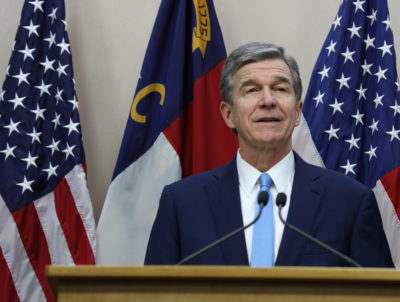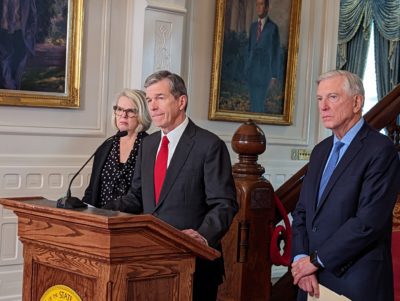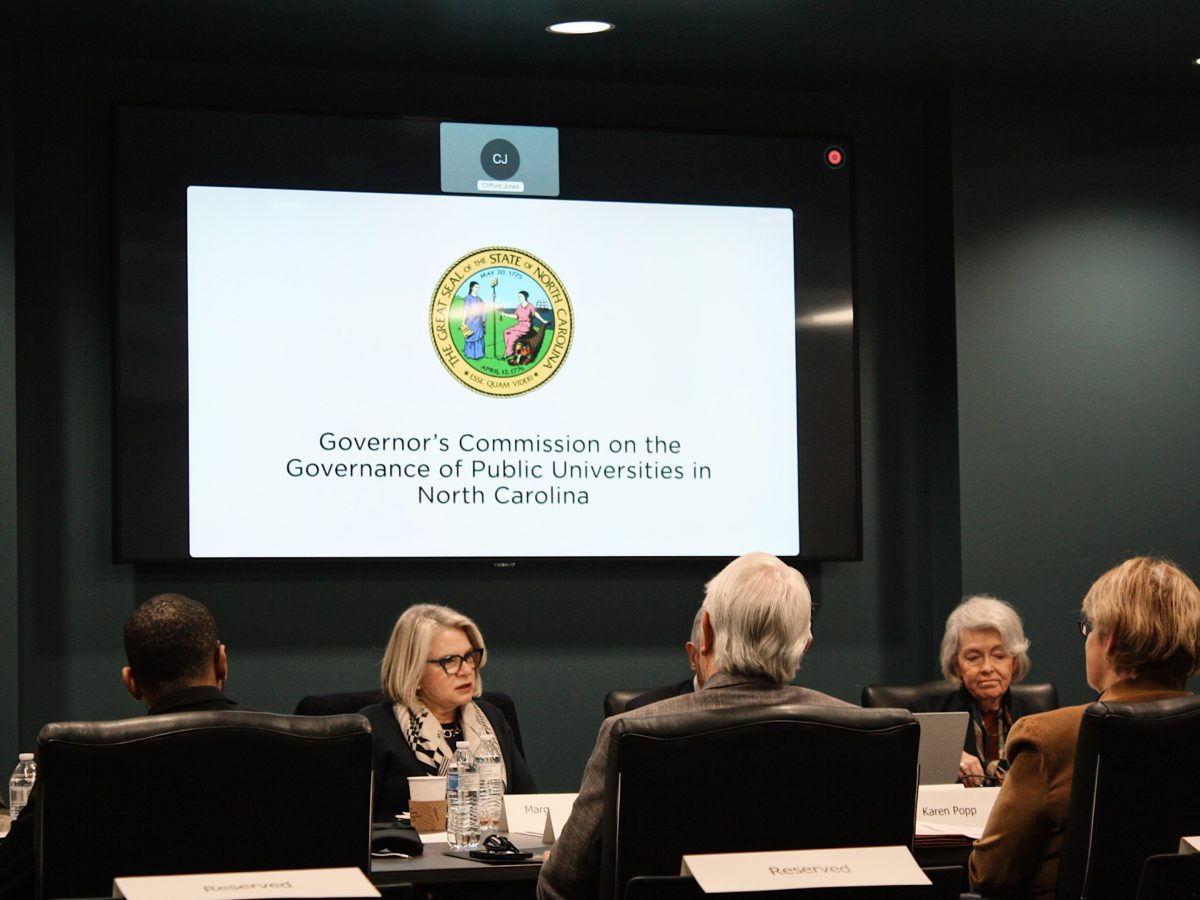

Share this story
- "Our job is to help create more resilient and effective structures that can ensure diversity of input and help engender trust and support from everybody," co-chair Margaret Spellings said.
- The commission, which meets next Feb. 7, will specifically look at the appointment methods for the UNC Board of Governors and various boards of trustees around the state.
|
|
Gov. Roy Cooper’s new commission to study public university governance met for the first time on Wednesday, Dec. 14 to discuss university governance history and context and lay out next steps and meeting dates.
The 15-member commission, co-chaired by former UNC System leaders Tom Ross and Margaret Spellings, will study how the governance of N.C. public universities can be reformed. The commission, which meets next Feb. 7, will specifically look at the appointment methods for the UNC Board of Governors and various boards of trustees around the state.
“I know we all believe that organizational governance is one of the most critical issues in any enterprise,” Spellings said on Wednesday. “Our job is to help create more resilient and effective structures that can ensure diversity of input and help engender trust and support from everybody.”
At Wednesday’s inaugural meeting of the commission, members were sworn in following brief remarks from Cooper. Members then spent the day hearing an overview of university governance in other states, the history of UNC System governance, public record and open meeting requirements, and current governance membership and responsibilities.
The commission also mapped out its work plan, including:
- A second meeting on Feb. 7.
- Four to six “mini hearings” across the state to gather public and stakeholder input. The sessions will focus specifically on ideas about improving university governance, and around three members should be present at each of the sessions.
- A third meeting in mid-April.
- A meeting in June to finalize their recommendations to Cooper. Those recommendations are due in a report to the governor by July 1.
Prior to the commission’s next meeting in February, the commission will receive additional governance data to review. Spellings and Ross discussed the possibility of drafting and sharing a survey for commission members before that meeting in order to know where members stand on particular governance issues moving forward.
This executive order deals with the state’s public university system, not the N.C. Community College System (NCCCS).
On Wednesday, Spellings asked a few questions about community college systems, including how other states integrated community college and university governance. In addition, she asked about the possibility of obtaining demographic data for NCCCS governance.
Spellings also mentioned the possibility of contributing to legislative discussions concerning higher education in the upcoming long session, which begins in January.
Any changes to the appointment process of university leaders would have to be approved by the legislature. At the announcement of the commission, Cooper said his goal is to prepare a proposal for consideration by the end of next year’s long session.
“There is going to be a lot of education legislation discussed in the General Assembly this time,” Cooper said. “Having something ready to be able to put into the mix and working swiftly, diligently with the knowledge that you already have is going to be clearly important.”
In addition to the commission’s four meetings, Ross said additional, shorter virtual meetings are possible. Both Ross and Spellings stressed the importance of the commission’s work, in North Carolina and as a potential model across the country.
“People are watching this all over the country – they really are,” Spellings said.
‘Better policies and insight’
Cooper announced the commission on Nov. 1, citing signs of undue political influence and bureaucratic meddling among university governance in the state.
“North Carolina’s visionary leadership in higher education has distinguished our state and made a real difference in the lives of people,” Cooper said Wednesday. “But we know there are signs of trouble that come when all of the appointed leaders are chosen by too few — signs of intolerance, bureaucratic meddling, undue influence, and singularity of political thought.”
The UNC System is made up of 16 public universities that serve nearly 250,000 students each year. Members of the UNC System Board of Governors, which oversees the entire system, are appointed by the state legislature. The Board of Governors then controls appointments to the individual universities’ boards of trustees as well as chancellors and presidents.
North Carolina is very unique in how it selects those boards, said Dr. Kevin Reilly, senior consultant and senior fellow with AGB Consulting, which will support the commission’s work.
Of 25 U.S. systems with public trustees for which AGB has data, 22 of them have gubernatorial appointments that are confirmed by the state senate. Only three of the 25 – Colorado, Nebraska, and North Carolina – elect their governance boards. Of those, North Carolina is the only state where the state legislature elects members; the other two states elect members by statewide popular election.
Republicans have maintained control of the state legislature, which appoints the Board of Governors, for the last decade. On Wednesday, Cooper emphasized the importance of diversity of leadership – in governance, but also on this commission.
“You guys have been leaders and champions of the system as students, alumni, and university trustees, members of Board of Governors, and elected officials who support and value the importance of a strong and healthy university system. You are eight Democrats, six Republicans, and one unaffiliated. You are men and women of different races, who have been affiliated in some way with at least 11 of our universities.”
— Gov. Roy Cooper
Cooper named members of the commission on Nov. 23. You can find a full list of those members here.
The demographics of UNC system trustees do not “perfectly mirror” the demographics of the state’s population or public university student enrollment, according to a report by Davidson College presented on Wednesday.
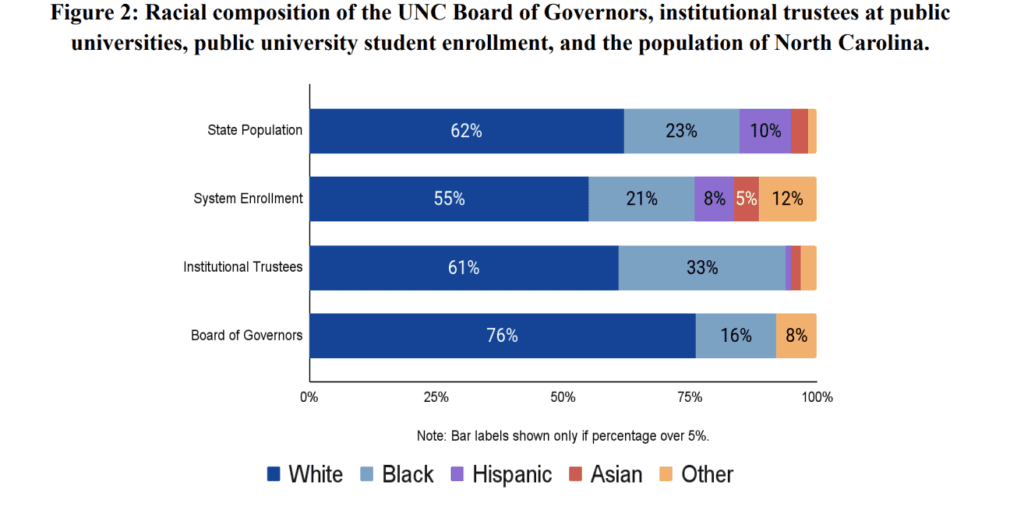

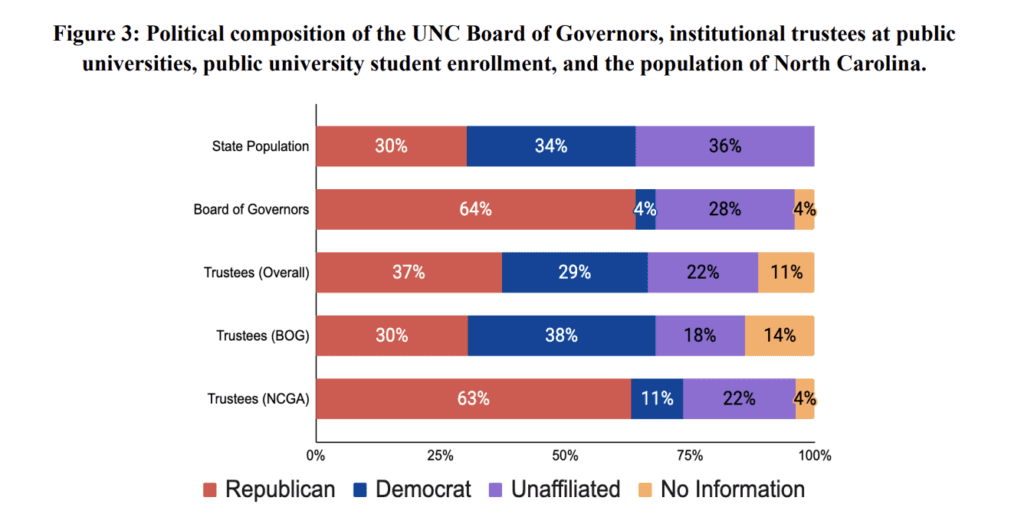

The majority of system trustees are male and white, the report found, with a plurality of Republicans. (There is only one registered Democrat on the Board of Governors.) There are zero Hispanic or Asian members of the Board of Governors.
Diverse governance matters, several commission members said.
“You end up with better policies and insight when you have different voices,” Ross said, also noting geographic diversity. “It does not guarantee performance, but it does enhance the chances of good performance.”
You can read the executive order establishing the commission here. You can also find information about the commission and its upcoming meetings on the governor’s website.



